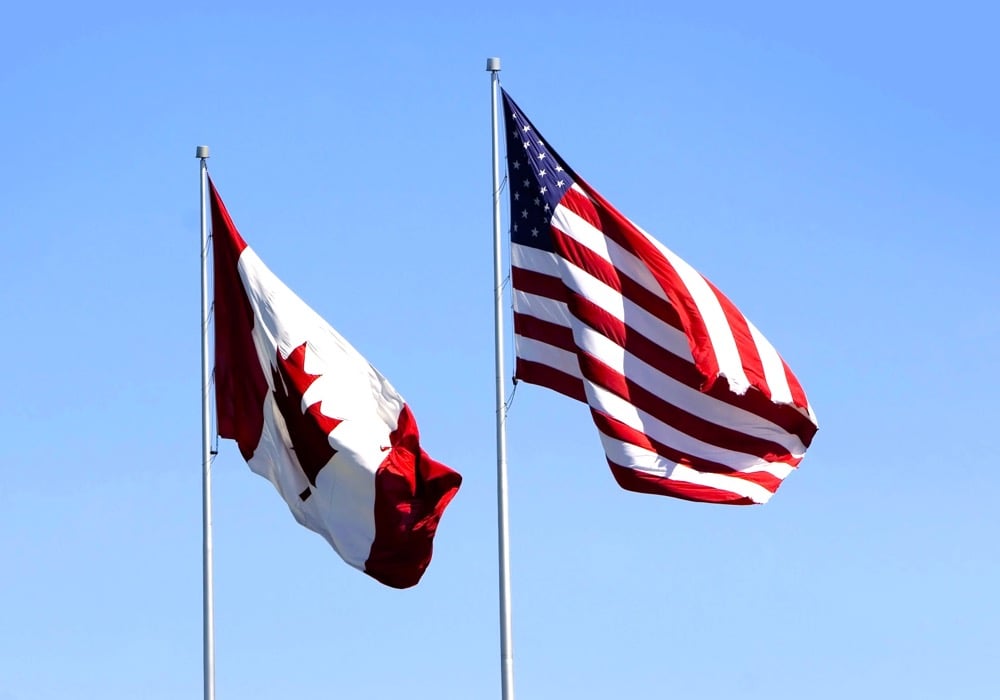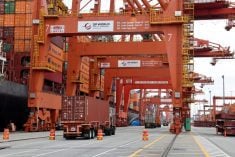A zero till pioneer from Minnedosa, Man., will soon be inducted into the Manitoba Agricultural Hall of Fame.
Bob McNabb, who switched to no-till farming in 1978 and is a long-time advocate of conservation agriculture, is one of the five inductees for 2014.
“I was quite surprised, humbled to be included in that group,” said McNabb, who operates a 1,000-acre farm and runs a farm supply business in Minnedosa. “I’m not a big award guy, so I wouldn’t have put myself in that category.”
The Manitoba Agricultural Hall of Fame announced this year’s class of inductees yesterday. The inductees will officially become members of the hall this summer at a ceremony in Portage la Prairie.
Read Also

Canadian trade data delayed by U.S. government shutdown
Canadian international trade data for September will be delayed indefinitely due to the ongoing partial shutdown of the United States government, Statistics Canada said Friday, Oct. 24.
McNabb’s fellow inductees for the Manitoba Agricultural Hall of Fame include:
• Ron Helwer, whose family has owned and operated Shur-Gro Farm Services in Brandon for decades
• Waldie Klassen, a Steinbach chicken farmer and an early advocate of supply management
• Don Kroeker, manager of Kroeker Farms, which became the largest potato producer in Canada
• Bill Siemens, a farmer near Rhineland who served as president of the World Association of Beet and Cane Growers and president of the Keystone Vegetable Producers Association
McNabb may not be an “award guy” but several organizations have recognized his efforts in the field of conservation agriculture over nearly four decades. McNabb has received the PFRA L.B. Thomson Conservation Award, the Agricultural Institute of Canada Recognition Award and the Little Saskatchewan River Conservation District Farm Family of the Year Award.
The Manitoba Agricultural Hall of Fame said McNabb was a worthy inductee for his conservation work in Western Canada and his efforts to introduce efficient and sustainable agricultural practices to Zimbabwe.
McNabb and his family first visited Zimbabwe in the winter of 1986-87.
The Canadian International Development Agency funded a project through the Agricultural Institute of Canada to evaluate the performance of co-operative farms in Zimbabwe.
“They were basically really poor peasant (farmers). That was what was represented by these collection of co-operatives,” said McNabb, who worked with the farmers to adopt more effective practices.
“We started them out on a no till system … seeding maize into no till conditions using a little bit of glyphosate, and they were having some really good results with it.”
McNabb traveled to Zimbabwe three more times to continue the project. It completely transformed his perspective on the world.
“Personally and for my family, it was an absolute life changing thing to work in that environment…. We’re a fortunate lot here, dealing with what we do compared to what some people (face).”
Unfortunately, Zimbabwe president Robert Mugabe instituted policies in the late 1990s that drove established farmers off the land. The president’s cronies took control of the farmland, McNabb said.
“That central part of Zimbabwe could feed all of southern Africa. There’s nothing now. For three or four years now they’ve been importing maize to feed their people. It’s an atrocity.”
Mugabe undermined his efforts, but McNabb has maintained relationships with the black and white farmers he met in Zimbabwe. Many of them visited Manitoba and stayed with McNabb to learn about agricultural practices in Western Canada.
McNabb, former president of the Manitoba North Dakota Zero Tillage Farmers Association, said the adoption of conservation tillage has been an incredible success story on the Prairies.
“That’s a massive change in only about 30 years. I wouldn’t of thought (it) would have happened that fast, but it truly has…. That system, while not 100 percent effective, is the closest thing we’ve got. It’s definitely beneficial but it’s not yet sustainable.”
While he isn’t focused on recognition, McNabb said he has dedicated a significant amount of his life to conservation agriculture and Minnagro, his ag supply business in Minnedosa.
All of McNabb’s work wouldn’t have been possible without the support of his wife Elaine and his children.
“My wife says I’m a workaholic and that’s probably true,” he said. “I’ve been very fortunate to have the experiences I have had. But I could not have done any of that without the support of my family.















